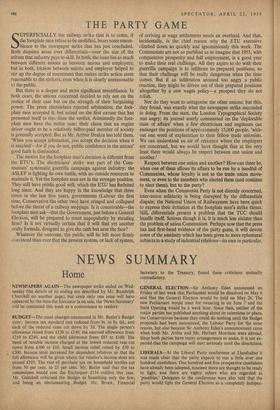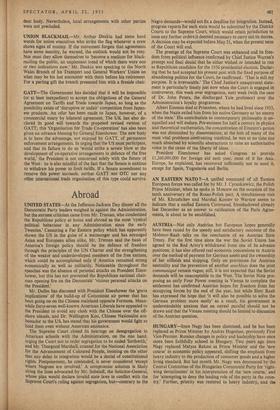BUDGET—The main changes announced in Mr. Butler's Budget were :
Income tax standard rate reduced from 9s. to 8s. 6d., and each of the reduced rates cut down by 3d. The single person's allowance raised from £120 to £140, the married allowance from 1210 to £240. and the child allowance from £85 to £100. The band of taxable income charged at the lowest reduced rate cut down from £100 to £60. Small income relief raised by £50 to £300. Income limit increased for dependent relatives so that the full allowance will be given where the relative's income does not exceed £105. The rate of purchase tax on household textiles cut from 50 per cent, to 25 per cent. Mr. Butler said that the tax concessions would cost the Exchequer £134 million this year. Mr. Gaitskell criticised the Budget as 'benefiting only the few, and being an electioneering Budget. Mr. Brook, Financial GENERAL ELECTION—Sir Anthony Eden announced on Friday of last week that Parliament would be dissolved on May 6 and that the General Election would he held on May 26. The new Parliament would meet for swearing in on June 7 and the State Opening would be a week later. Since then, neither of the major parties has published anything about its intentions or plans, the Conservatives because they could do nothing until, the Budget proposals had been announced, the Labour Party for the same reason, but also because Sir Anthony Eden's announcement came when both Mr. Attlee and Mr. Herbert Morrison were abroad. Since both parties have many arrangements to make, it is not ex- pected.that the campaign will start seriously until the dissolution.
LIBERALS—At the Liberal Party conference at Llandudno it was made clear that the party expects to run a little over one hundred candidates. One hundred and five prospective candidates have already been adopted, nineteen more are thought to be ready to fight, and there are eighty others who are regarded as 'possibles.' l)elegates to the conference were also told that the party would fight the General Election as a completely indepen- UNION BLACKMAIL—Mr. Arthur Deakin had some hard words for union executives who strike the flag whenever a crew shows signs of mutiny. If the movement forgets that agreements have some sanctity, he warned, the outlook would not be rosy. Nor must they allow themselves to 'become a medium for black- mailing the public, an unpleasant trend of which there were one or two indications now.' Mr. Deakin was speaking to the North Wales Branch of his Transport and General Workers' Union on what may be his last encounter with them before his retirement. For a parting gift the branch presented him with a fireside chair.
GATT—The Government has decided that it will be impossible (or at least inexpedient) to accept the obligations of the General Agreement on Tariffs and Trade towards Japan, so long as the possibility exists of 'disruptive or unfair' competition from Japan- ese products. An offer has been made to Japan, however, of a commercial treaty by bilateral agreement. The UK has also de- clared its good will towards the proposed revised version of GATT; this 'Organisation for Trade Co-operation' has also been given an advance blessing by General Eisenhower. The new body is to have the advantage, not enjoyed by GATT, of permanent enforcement arrangements. In urging that the US must participate, and that its failure to do so 'would strike a severe blow at the development of co-operative arrangements in defence of the free world,' the President is not concerned solely with the future of the West : he is also mindful of the fact that the Senate is anxious to withdraw his power to limit tariffs. If a Senate amendment to remove this power succeeds, neither GATT nor OTC nor any other international trade organisation of this type could survive.











































 Previous page
Previous page